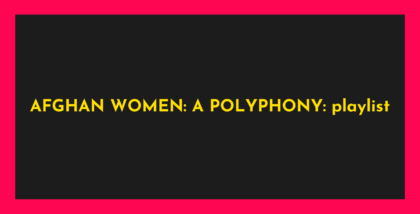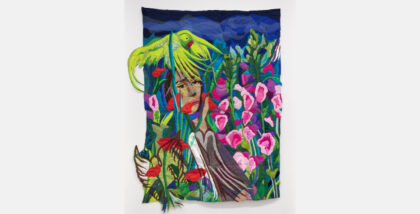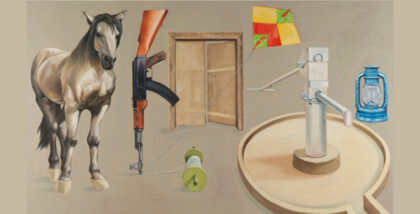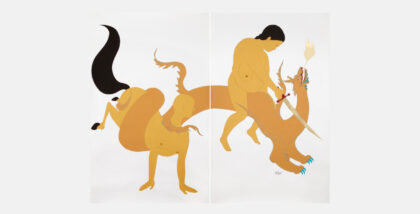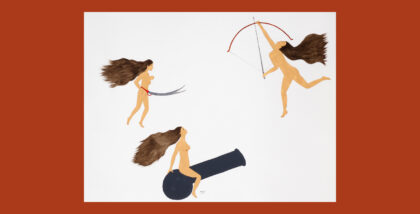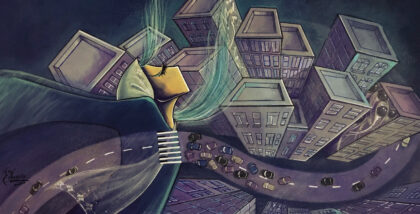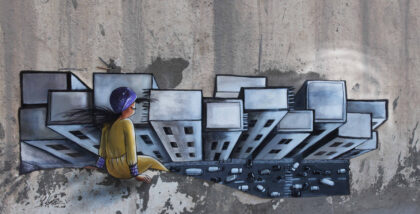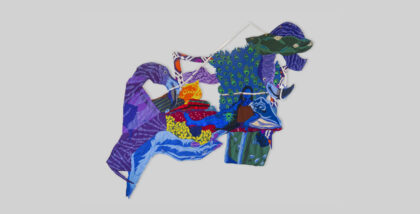 The Warm War, 2019, gouache and gold leaf on paper, Kubra Khademi. Courtesy of Galerie Eric Mouchet.
The Warm War, 2019, gouache and gold leaf on paper, Kubra Khademi. Courtesy of Galerie Eric Mouchet.
Translated from the Persian by Salar Abdoh
I never had a sister, but there has always been Salma, the child of my father’s uncle, the same uncle who studied medicine in India and later helped set up Kabul’s medical school. All his life the man had been busy with academia, but then, toward the end of his life, he up and married a woman from Kandahar. Salma was the product of this uncle’s late resolution. Before long, the aged uncle died, the Russians attacked Afghanistan, and Salma and her mother left the country for good.
This much I had heard from other family members. But our first somewhat tentative meeting took place 30 years later through our laptop cameras. Salma is a few years older than me and never visited Iran, the country next door that my father escaped to after the Russians—the Soviets—attacked us. Still, she speaks Persian as well as I do, even though her mother’s native tongue was Pashto. Soon we were spending hours every day online chatting—me in Shahrud, Iran, and Salma in Zurich, Switzerland.
*
It is 2010. We both gave birth more than half a year ago. My child’s father is Iranian; Salma’s is American.
Salma has been complaining about her child’s upset stomach and I have been telling her that in Iran they give children a mint extract solution to ease the pain.
Salma holds her biracial infant in front of her computer. The kid seems to me to be a healthy blend of her African American husband and Salma herself.
“Really, mint extract? Where do I get it?”
“Find a Persian supermarket. I’m sure you’ll find it there.”
Her infant remains in her arms, crying. I put on headphones so my own won’t wake up because of the other child’s noise.
“I know of an Afghan market. Will they have it?”
“They might.”
She holds baby Matthew close to the monitor. He’s so beautiful. I want to reach across that screen and embrace him. He seems bigger and far more aware of his surroundings than my child at seven months old. I mention this to Salma, asking with some uncertainty, “Do you think this might have something to do with genes, or is it the difference between the food supplements you have over there and the ones I have here?”
She’s silent. Baby Matthew stares back at me. Salma caresses him and talks to him in German. Finally, she says, “You said you wanted to visit Afghanistan. What will you do about the baby’s diet when you’re gone?”
The idea for a visit to Afghanistan was just that, an idea. I’d imagined I might get rid of my postpartum depression with a visit to the home country. While we talk, I also search through the picture files on the computer for a photograph another cousin of ours recently sent me. “Afghanistan can wait. I can’t just leave the baby and go away right now.”
Salma nods in approval. And I finally find what I’ve been looking for in the computer, the picture of what looks like a little store in Kabul.
Ataei Publications, it reads. I post the picture for Salma.
“Do you see the bullet holes on the storefront display?”
Salma doesn’t react. Her kid has suddenly fallen asleep and mine has suddenly woken up. We live our lives around our laptop conversations. I pick up my child from the cradle, breastfeeding time. I unbutton my shirt and press him gently to my chest. Salma has gone off screen. I assume she’s gone to put the baby to bed. She returns after a few minutes, sees us together and right away starts with our usual terms of endearment for our babies.
“Mine always has diarrhea,” I say. “He’s a little too thin, no?”
“Naturally he’s thin. His father’s just an Iranian.”
For the first time in all our talks I’m short of words. Stunned, really. I haven’t a clue what to say to what she has just said and whom to defend. The smallness of Iranians compared to Americans? Salma’s arrogance and condescension are like a bullet to my brain.
“At least Iranians never murdered Afghans,” I exclaim. Then I make a correction, “I don’t know if they have or not. All I know is they never rained bombs on Afghanistan, unlike some countries.”
Salma’s face remains a mask.
I go on. “Besides, what do you think America is doing in Afghanistan right now? You really believe they’re there to fight the Taliban?”
Salma stays mum. My child has finished feeding. He pokes his head out from under my shirt and stares into space.
Salma, trying her best to end this sudden awkwardness, says, “On the other hand, Iranians are smart. All over the world they’re known for how clever they are.”
Clever? At this point I could care less what Iranians are or aren’t; what’s important is that something, a wound I think, has been opened or reopened between Salma and me. She has no idea that the wife of one of our cousins was recently killed by the Americans. I doubt if Salma even knows of this woman. The Americans apologized saying it was a mistake. These kinds of mistakes are part and parcel of our family history—just as Salma’s showing off her American baby from the luckier part of the planet is also a part of our history. I wish I could fathom why what Salma has said grates on my nerves. She meant nothing by it, I’m sure. Or everything. I stay quiet and with my free hand wipe the dust around the laptop. I cannot get myself to look into the monitor just yet.
Salma says, “Look, no one from baby Matthew’s father’s family is in the American military.”
No one said they were. And yet whichever way I look at it, Afghans have not had a day of peace ever since those skyscrapers went up in flames in New York. September 11th wasn’t our cousin’s wife’s fault, but how do I say any of these things to someone whose husband is American but conveniently has no association with the American military?
Salma posts a picture of her baby in her husband’s arms. Her husband seems like a kind man. She wants to convey to me that baby Matthew’s dad is not America, certainly not the American military. But there is spite in my heart right now and I can’t quite get rid of it.
“How nice!” I bring out coolly.
Salma looks visibly scared all of a sudden. She says, “Americans have been kind to us, my sister. Believe me!”
The kindness of Americans is a non-issue to me right now. Salma cannot possibly know, but I do, that during the first Taliban period there was a shortage of shrouds and a black market for the cloth to make them. Chinese factories were making a killing from Afghan deaths. How can I sit here today and explain to someone who has barely seen this side of the world since her childhood about this thriving market that depends on the spilling of Afghan blood? How can I explain anything when Salma and I are just two women in other people’s lands, guests in other people’s homes?
My thin boy begins to cry. I pull myself up with him in my arms and pace back and forth in front of the table. I gaze at the photograph of myself and my husband on the wall. My husband is hardly slender, but there’s no comparing him to that strapping spectacle of health and brawniness that is Salma’s American husband. I despise myself for these thoughts. It’s as if I were comparing horses. Two horses for breeding’s sake. I am embarrassed.
Salma posts in the chat: The magic of pedigree!
I send her a smiley. But the truth is that this talk has thrown me into an eddy, and I can’t escape from it. I must have that look I sometimes get when I’m trying to hide something. Why should Salma understand my point of view when I don’t even understand it myself?
As if to cut the conversation short, Salma says, “I didn’t mean anything by it. Take care.”
In the lives of women like us there are ridiculous moments made up of pure struggle and fury, moments that have to do with what we are. Something inherited from generations of grief passed on from mother to daughter and womb to womb. It’s a stupid affair, but there it is—a combativeness whose source is vague and yet it jolts every fiber of our aggression into action. Maybe that’s why even now I won’t let it be and I bark at Salma, “Don’t be so proud of that magic of pedigree. Think instead about America being in Afghanistan. Don’t think about baby Matthew or his father. Think about what America has done to us.”
Looking indignant, Salma shoots back, “You’re talking crazy, and you won’t stop thinking about your husband. What I’m thinking about is President Obama, alright? Look, Obama wants to make peace with the Taliban. Once that happens, Afghanistan will be free. The world must be run by exceptional men. Americans, they are…”
“Exceptional men!” Deliberate forced laughter is all I can throw back at her. “Big men. Stallions. Horny stallions!” I feel like vomiting everything at her. I feel like telling her about our cousin’s wife whom neither of us had ever seen, the one who was killed by an American mistake. “Haroon’s wife!” I snap.
“What about Haroon’s wife?”
“Americans killed her by mistake. Just like that! Do you get it? Mistake. It’s war. WAR.”
Salma stares back at the screen as if waiting for more from me. Then she says, “Exactly. It’s war. War. These things happen.”
“Listen to me,” I go on breathlessly, “Bin Laden didn’t just bring down the Twin Towers. Bin Laden destroyed my life, and your life. Why? Because he brought the Americans to our country. I don’t care if you have an American husband. They killed you, too. Don’t you see?”
“No, this was all Iran’s fault. Bin Laden was in Iran the whole time. How can you defend your husband and his country? Why do you defend those people?”
We’ve gone back to the tired refrain of my husband-your husband. Still, I’m not willing to give up so easily. “It isn’t like that at all, my girl. Bin Laden was never, ever in Iran. He was in Pakistan. Don’t you ever watch the news?”
“Iran is nothing but a fraud. I can’t believe you defend those people and even bore a child by them.”
My child is outright bawling now, and I still cannot pull away from that damn screen. I smile viciously and say, “And you? It feels good to get poked by an American? The report cards of Europe and America are plain as day, don’t forget. Everyone knows what they’ve been up to for years and years.”
She yells back with typical Afghan spite, “No, no! Iran is Russia. Iran is another Russia!”
The baby screams. So do I, “Iran is NOT Russia. Those Russians…”
I have a lump in my throat and cannot go on. Salma looks just as badly off. Finally, she says, “Please let it go. Tell me instead, what did you mean by bullet holes on that storefront in Kabul?”
Why anything? For years I’ve been studying weaponry. I think about things like who was killed with what kind of weapon. On my computer there are entire files on weapons and their ammunition. I read up on battles and battle formations. It’s a pointless preoccupation and often I envy my own brothers who are faraway and haven’t thought about Afghanistan for years. Instead, I have a story in my head for every one of those killing machines on my computer. If I were to tell Salma about this, she’d think I was out of my mind.
“What I meant to say is those bullet holes were from as far back as the time of the Russians in our country, but the store display just stayed the way it was. During the entire time of the Taliban and after, they never changed it. They just kept it like that, bullet holes and all.”
Salma is talking with someone outside of the frame of the screen. She appears to wave goodbye to them. Then she turns to me and asks, “There would have been a difference if they changed it?”
I shake my head. No. Of course not. Pain is pain and bullet holes are bullet holes, no matter where and whom they come from—Russian or Taliban or American. And what does anyone care if once upon a time there was a small publishing house display riddled with bullet holes in Kabul, a display with our family name, Ataei!
My infant finally settles down and gazes curiously at the screen. Salma makes faces at him. The boy reaches a hand to try and grab at air. Salma blows kisses at him and voices love in German.
It dawns on me that at the end of the day Salma is just a German mother with a Swiss accent and I am of the Iranian variety. How absurd. How unlike ourselves we’ve turned out.
“Salma, America never does anything without a reason. As we say here, Cats don’t hunt mice just for the hell of it.”
Salma’s screen kisses disappear. “Bin Laden was in Iran. They say he had a house somewhere in the forest.”
Our talk, two Afghan women, is turning stranger by the minute. I say, “That’s what your Western press says. All of it lies from your radio and television.”
“And where you happen to live, they tell nothing but the truth?”
I’ve run out of steam. We’re sitting in our respective living rooms on two adjoining continents defending things that don’t even belong to us, things we don’t fully understand. Neither one of us has a grasp of politics. We are nobodies, refugees who are still only harping on the magic of pedigree. We would have done well to stick to what we know—motherhood and giving advice on mint extract to get rid of a child’s upset stomach.
The imaginary air between our laptops sits thick. We are frustrated with each other, with circumstance, with our babies, with history, with everything that has brought us to this moment. I leap up again with my baby and pace back and forth.
“Americans see their soldiers as heroes,” she says. “Men who left their wives and children to fight for the Afghan nation.”
I mumble under my breath, “Women left, too, you idiot.” Then more loudly I say, “No one asked for their help.”
She persists, “They left their comfortable lives to help us.” I’ve turned away from the screen and won’t look at her. But she won’t let go, “Why don’t Iranians do the same? If as you say your Iranians are such great people, why won’t they go and help Afghanistan?”
I finally turn to face her. “I guess they won’t go to war in Afghanistan because they’re thin and weak, unlike your Americans. Or maybe because they are not as kind as your fabulous Americans. What is it you are driving at, Salma?”
“That’s right, those people are weak. You shouldn’t deny this just because you are married to one of them.”
Salma’s image floats momentarily into a thousand broken images on my laptop. Each part of her is like a badge of our own wretchedness, our refugee identity, our migrant nothingness, and the pedigrees that we latch onto out of desperation. Why are we searching for other people instead of our own so-called men to defend our mother country? Where are our men anyway?
“Have you ever wondered where our own men are?” I challenge her. “How come it isn’t they who are our heroes instead of your Americans?”
She doesn’t miss a beat, “Because they’re not even the fathers of our children. If they were men, surely, we’d be their wives. But we’re not, are we?”
My entire being trembles at her words. Despite all her asinine judgments, she is saying something that has a grain of truth. For years, decades, Afghan men have not been the fathers of our children and we, the Afghan women of my generation, have been giving birth in the countries of strangers. I feel as frozen as the men of Afghanistan and as impotent. I wish there was someone here I could share this feeling with, but Salma is not that person. The truth in Salma’s cruel words massacre me.
“I have to go to the doctor,” she says, changing the subject. “Can you believe it, after all this time the stitches from my C-section still sting. I can’t even exercise!”
“Me too,” I barely whisper. “I still have pains ever since the delivery.”
She truly looks drained from our skirmish. “Do you believe me now? Honestly, no one from baby Matthew’s family has been a soldier.”
What’s there to say? I look at my child for a second and answer, “No one from my Rasa’s family either. At least not ones who invade other people’s lands.” The reality of the absence of men, our own men, sits on my mind like the wreckage of war. It’s as if for centuries we’ve been neutered as a people. “Go to the doctor, Salma,” I say softly.
Baby Rasa starts crying again. Salma lifts her own blouse and shows the surface area of her C-section. She presses over the sores and something white oozes out of the line of stitches. She’s saying something to me, but I don’t hear her. My own kid is crying with fresh energy. I gently press Rasa to my breast, and he takes my nipple with a ferocity and a hunger I’ve never seen in him before. His first teeth came in some time ago and I imagine blood mixing with my milk. The wounds of these births, they are not the kind that heal.
